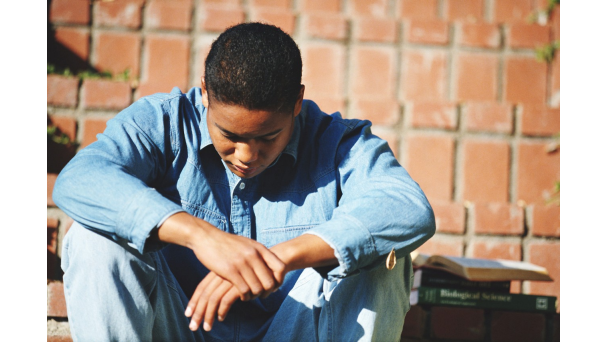Suicide
Depression and Suicide in Black Youth
Early warning signs and coping strategies for parents
Posted July 30, 2015
Depression is a serious mental health issue that significantly impacts the lives of many youth. Data from the National Institute of Mental Health (NIMH, 2015) notes the following rates among adolescents:
- Major depression occurs in about 9% of teens ages 12 to 17
- Depression is more common in girls (13.7%) then boys (4.7%)
- Among Black youth about 7.9% meet diagnosis for major depression

Although those teens that experience depressions don’t always have suicidal thoughts it is a common concern. One study found that among Black youth 3.2% reported some suicidal thoughts in the past year; and 1.4% reported attempting suicide (Joe et al., 2009). This may seem like a small number. However, suicide is the third leading cause of death among Black youth (Lincoln et al., 2012).
Common Signs of Depression
- Persistent sad, anxious, or "empty" mood
- Feelings of hopelessness, pessimism
- Feelings of guilt, worthlessness, helplessness
- Decreased energy, fatigue, being "slowed down"
- Difficulty concentrating, remembering, making decisions
- Difficulty sleeping, early-morning awakening, or oversleeping
- Appetite and/or weight changes
- Thoughts of death or suicide; suicide attempts
- Restlessness, irritability
Suicide Warning Signs
- Talking about wanting to die or to kill themselves.
- Looking for a way to kill themselves, such as searching online or buying a gun
- Talking about feeling hopeless or having no reason to live.
- Talking about feeling trapped or in unbearable pain.
- Talking about being a burden to others.
- Increasing the use of alcohol or drugs.
- Acting anxious or agitated; behaving recklessly.
- Sleeping too little or too much.
- Withdrawing or isolating themselves.
- Showing rage or talking about seeking revenge.
- Displaying extreme mood swings.
Helping Your Child Cope with Depression
Below are a few suggestions for helping your teenager and family cope with depression. These are minor coping strategies and may not be specific to your child’s individual needs. Please consider seeking a professional counselor or psychologist in your area for continued treatment and monitoring.
- Engage in cultural or religious practices such as prayer. These may be helpful for decreasing suicide and providing social support.
- Increase family activities and engagement in the community. Strong connections provide hopefulness and emotional support.
- Contact the National Suicide Prevention hotline (available 7 days a week) for free and confidential support 1-800-SUICIDE
- Get connected to a therapist or mental health provider. Remember it’s your decision and your child’s to decide whom you want to work with. It’s okay to ask if they have experience working with the issues that are most important to you and your family.
Copyright 2015 Erlanger A. Turner, Ph.D.
About the Author
Erlanger Turner, Ph.D. – often referred to by his clients as Dr. Earl – is a Clinical Psychologist in Houston, Texas. He is also an Assistant Professor of Psychology and teaches courses on clinical psychology and multicultural issues. Dr. Turner specializes in child and adolescent disorders, parenting, and psychological assessment. His research interests focus on psychotherapy use, mental health equity, and access to behavioral health services for youth. He has published articles in scholarly journals and in national media sources such as New York Times, and Washington’s Top News.
Visit my website for more information: www.drerlangerturner.com
Follow me on twitter @DrEarlTurner
Like me on Facebook www.facebook.com/drearlturner
Read my Psychology Today blog
https://www.psychologytoday.com/blog/the-race-good-health/
References:
Joe, S., Baser, R. S., Neighbors, H. W., Caldwell, C. H., & Jackson, J. S. (2009). 12-month and lifetime prevalence of suicide attempts among black adolescents in the National Survey of American Life. Journal of the American Academy of Child & Adolescent Psychiatry, 48(3), 271-282.
Lincoln, K. D., Taylor, R. J., Chatters, L. M., & Joe, S. (2012). Suicide, negative interaction and emotional support among black Americans. Social psychiatry and psychiatric epidemiology, 47(12), 1947-1958.
NIMH (2015). Depression among adolescents. Retrieved from http://www.nimh.nih.gov/health/statistics/prevalence/major-depression-a…
SAMHSA (2015). Suicide warning signs. Retrieved from http://www.suicidepreventionlifeline.org/learn/warningsigns.aspx




